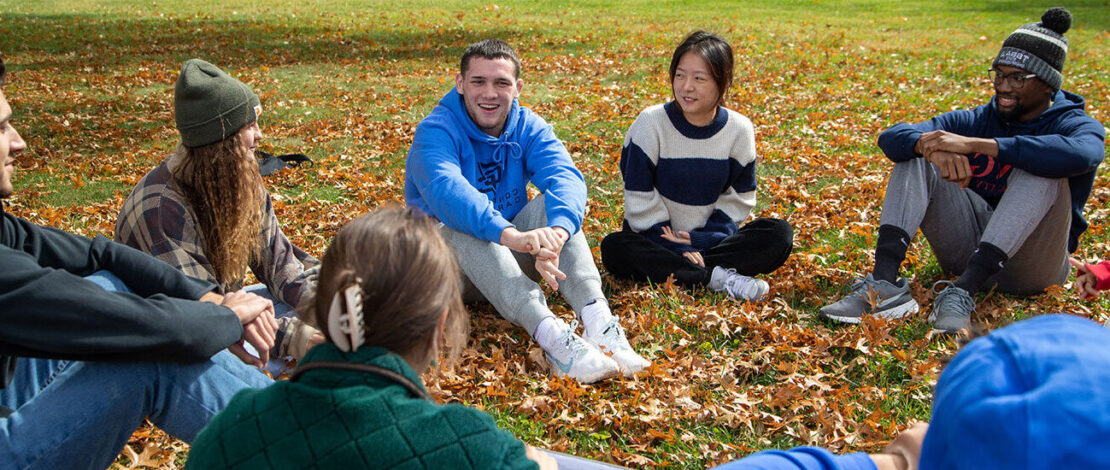B.S. Psychology Overview
The online Bachelor of Science in Psychology degree at King University is a broadly applicable degree that prepares you for career advancement.
Designed to educate students in the breadth and depth of psychological theories and research with special emphasis on how these areas relate to the real world, our online psychology degree gives you the skills you need to enter higher positions of responsibility in any number of careers. The program allows students to work within a diagnostic framework, learn about evidence-based techniques, and integrate faith and learning. The program also prepares you to grow as a critical thinker by collaborating with your peers within an accessible setting.
Our comprehensive curriculum is divided into four thematic semesters. Each semester emphasizes certain facets of the field:
- Knowledge Base: Social Psychology, Lifespan Development, Cognitive Psychology
- Research: Statistics for the Social Sciences, Research Methods and Measurement, Individual Research Project
- Clinical: Theories of Personality, Abnormal Psychology, Theories of Counseling
- Application: Group Dynamics, Survey of Christian Counseling, Applied Psychology, and more
Because our degree is offered fully online, you’ll can earn your degree with ultimate flexibility. A digital format provides the opportunity to attend school when and where it’s right for you. while maintaining your commitments to work and life. Plus, you’ll immediately be able to apply your knowledge to your job.
According to the Bureau of Labor Statistics, psychologist jobs are expected to grow 14 percent by the year 2026, a rate considered much faster than average. However, ample career opportunities exist outside of this direct application. Graduates of our online psychology degree may work in schools, rehabilitation centers, businesses, marketing firms, law enforcement, child protective services, political offices, or laboratories, among other settings. The program also prepares you for further graduate study. Major coursework can be completed in 16 months.
The B.S. in Psychology Degree is Designed for…
- Working adults with some college credit seeking to finish their bachelor’s degree
- Adult learners wishing to study a broadly applicable field
- Caring individuals who want to enter the helping professions

Accolades
King has been ranked as one of the Best Online Bachelor’s in Psychology programs by Edsmart.
Courses and Requirements
Our online Bachelor of Science in Psychology requires 52 semester hours (13 courses) of major coursework and a program introductory course. To graduate from King University, students must complete a total of 124 semester hours, including major courses, general education core courses, and additional courses that may come from transfer credits or electives.
To graduate from King University with a baccalaureate degree, all students must have earned 30 semester hours of Common Experience and General Education courses. These courses include Foundations of Christian Thought and Practice, Citizenship, English Composition, Human Creative Products, Quantitative Literacy, Science, and additional credit hours from General Education courses.
Students must earn a total of 38 semester hours of General Electives.
| Course # | Title | Description | Credits |
|---|---|---|---|
| PSYC 1520 | Introductory Psychology | An introductory survey of the major areas of current psychology such as the scientific method, the biological bases for behavior, sensation and perception, consciousness, learning, memory, language and thought, motivation and emotion, life-span development, personality, stress and coping, psychological disorders, psychotherapy, and social behavior. Emphasis on the methods of obtaining reliable knowledge of human behavior and cross-cultural perspectives on that research and theory. | 4 |
| Course # | Title | Description | Credits |
|---|---|---|---|
| PSYC 3000 | Social Psychology | An analysis of the ways in which the social environment influences thought, affect, and behavior. Topics covered include how we perceive our social world and the causes of events, stereotyping and prejudice, attitude formation and change, group processes, close relationships, self concept and self-esteem. Emphasis is on the use of both theory and research to understand the social influences on why we think, feel, and behave the way we do. Prerequisite/Corequisite: PSYC 1520 | 4 |
| PSYC 3040 | Cognitive Psychology | The study of how people acquire, store, and use information with special emphasis on the impact of advances in brain and computer research. Basic topics include perceptual processes, attention, automatic processing, implicit and explicit memory, declarative and episodic memory, forgetting and disorders of memory. Prerequisite/Corequisite: PSYC 1520 | 4 |
| PSYC 3050 | Lifespan Human Development | A study of the growth and development of the individual from conception to death. Emphasis will be placed on the multidimensional nature of development (physical, cognitive, emotional, and social) paying special attention to diversity in individual life paths and the multiple interacting contextual influences on development (biological, psychological, social, community, societal, cultural, and historical). This course includes the study of major developmental theories and concepts as well as the research methods used in the study of lifespan development. Prerequisite/Corequisite: PSYC 1520 | 4 |
| PSYC 3100 | Statistics for the Social Sciences | A comprehensive presentation of the statistics that social scientists use to describe information in meaningful ways and to test hypotheses about human thought, behavior, and emotion. Topics covered include the role of statistics in the research process, frequency distributions, sampling, descriptive statistics, hypothesis testing, correlation, analysis of variance, and non-parametric tests. Prerequisite/Corequisite: PSYC 1520 | 4 |
| PSYC 3150 | Research Methods and Measurement in Psychology | A comprehensive presentation of the diverse methodologies that psychologists use to test hypotheses about human thought, behavior and emotion, including a discussion of how psychologists measure psychological variables. Topics covered include correlational design, experimental design, quasi-experimental designs, measurement theory, case studies, autobiographical narratives, methods of observation, research ethics, and the preparation of research manuscripts for publication. By the end of the course, students will have critiqued published research articles and developed a research proposal summarizing a psychological study they plan to do the following semester. Prerequisite/Corequisite: PSYC 1520, 3100 | 4 |
| PSYC 3200 | Individual Research Project | Each student, with the supervision of the professor, will conduct a research project. This will involve reviewing the literature in a particular area of study, developing a sound research hypothesis, designing a study to test the hypothesis, data collection and analysis, discussing the implications of results, and writing a manuscript. Prerequisite/Corequisite: PSYC 1520, 3100, 3150 | 4 |
| PSYC 4000 | Theories of Personality | A survey of the major psychological perspectives on human nature (dynamic, dispositional, phenomenological, and cognitive/behavioral), including how each perspective does research, assessment, and treatment, and how each explains the origins and development of personality. Prerequisite/Corequisite: PSYC 1520 | 4 |
| PSYC 4050 | Psychopathology | This course covers the diagnostic criteria and major theoretical explanations for various psychological disorders, including anxiety, mood, psychotic, and personality disorders. Prerequisite/Corequisite: PSYC 1520 | 4 |
| PSYC 4100 | Theories of Counseling | Survey of the major theoretical models of psychotherapy (dynamic, phenomenological, cognitive/behavioral, and family systems). A discussion of practical elements of counseling (ethical considerations, interviewing, confidentiality, ethnicity, and credentials) is included. Prerequisite/Corequisite: PSYC 1520 | 4 |
Three of the following:
| Course # | Title | Description | Credits |
|---|---|---|---|
| PSYC 4150 | Group Dynamics | A survey of the basic issues of group process, including legal, cultural, ethical, and professional issues. Stages of group development and group leadership skills will be explored from both theoretical and experiential perspectives. Prerequisite/Corequisite: PSYC 1520 | 4 |
| PSYC 4200 | Survey of Christian Counseling | The study and application of integrating the orthodox Christian faith and the vocation of people helping. An examination of various integration strategies and the theological basis of each as well as an examination of some basic strategies for Christian counseling. Students will practice what they have been exposed to in the form of a peer-mentoring relationship. Prerequisite/Corequisite: PSYC 3010; PSYC 1520 | 4 |
| PSYC 4250 | Applied Psychology | This course will introduce students to the application of psychology in a variety of settings and work situations. The student will be introduced, although not exclusively, to clinical psychology, health psychology, educational psychology, occupational psychology, and forensic psychology. The students will explore the major historical trends and research methods common to these areas of applied psychology. Additionally, students will explore a variety of career options in psychology. Prerequisite/Corequisite: PSYC 1520 | 4 |
| PSYC 3330 | Child and Adolescent Development | Study of the growth and change of the individual from conception through adolescence, emphasizing physical, cognitive, social, and emotional development. Includes study of major developmental theories, concepts, and research methods that are applied to childhood and adolescence. Interviews and research literature reviews are completed to demonstrate understanding and application of course material. | 4 |
| PSYC 2200 | Marriage and the Family | An introduction to a developmental study of marriage and family life (as a quest for intimacy) in a world of rapid social change. Special attention is given to American myths; diversity in families; gender roles; sexuality, dating, falling in love; mate selection; the single option; communication, power, and conflict in marriage; work and home; parenting; the family life cycle; family crisis; separation and divorce; remarriage; and stepfamilies. | 4 |
| PSYC 3530 | Sensation and Perception | This course is a study of how humans sense and perceive the world. The course will include an evaluation of sensory and perceptual processes and how those processes culminate in our rich perception of the world. Special emphasis will be placed on psychophysical procedures, visual perception, and auditory perception. In addition, topics in olfaction, taste, touch, and the influence of knowledge on perception will also be addressed. | 4 |
| PSYC 3900 | Special Topics in Psychology | Advanced readings and research for individual outstanding juniors and seniors majoring in Psychology. | 2 |
To view the full Academic Catalog, CLICK HERE.
Admission Requirements
Students applying for the online psychology degree program must meet the following requirements:
- Minimum cumulative GPA of 2.2 on a 4.0 scale
- Students with less than a 2.2 high school GPA may be considered and accepted on a conditional basis provided they are able to demonstrate their plans to succeed in the program.
General Admission Requirements
General requirements for admission to King University include graduation from an accredited or recognized high school, GED, or secondary institution with a minimum of 16 academic units, distributed as follows:
- Four units of English
- Two units of algebra (Algebra I and II)
- One unit of geometry
- Two units of foreign language
- Two units from history and social studies
- One unit of natural science
- Four units of other academic electives
Students educated at home should follow the same procedures as any other candidate for the freshman class.
Students should present a high school transcript and documentation, or its equivalent.
How to Apply
Students applying for an online psychology degree program must submit the following materials:
- A completed online application
- Official transcripts from all institutions attended
Have questions about this program or the admissions process? Request information and get connected to one of our knowledgeable enrollment counselors.
Career Outcomes
- Social and Community Service Manager
- Social and Human Service Assistant
- Healthcare Social Worker
- Educational, Guidance, and Career Counselor
- Child, Family, and School Social Worker
- Rehabilitation Counselor
- Market Research Analyst
- Marketing or Advertising Manager


Studying online prepares you for a successful future. Discover a learning format that offers:
- Flexibility
- Personalized Academincs
- Equal Excellence
- Opportunity for Self Insight
